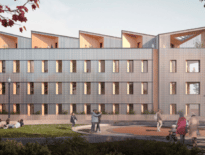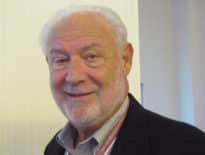Taylor Cain
Director, City of Boston Housing Innovation Lab
Age: 30
Industry experience: Seven months
Taylor Cain was named director of Boston’s Housing Innovation Lab in September. The agency, part of the city’s Department of Neighborhood Development, studies new housing models that reflect the current needs of Bostonians. The lab has spearheaded pilot programs enabling residents to create additional dwelling units in their homes, eliminates minimum square-footage requirements in multifamily projects, and invites developers to build housing on municipal properties. A Jamaica Plain resident, Cain recently completed her doctorate in sociology at Boston University, where she studied the effects of gentrification on Boston neighborhoods.
Q: How strong has been the response to the compact living pilot program that eliminates minimum square-footage requirements in multifamily construction?
A: We’re starting to see a fair amount of interest in utilizing these guidelines to create new types of development project. We’ve had a number of proposals that include all-compact units, or significant numbers of compact units, that span the geography of the city: Fields Corner, we’re having conversations in Mattapan. There is a co-living project proposed in Allston, and we’re really seeing it utilized across different parts of the city which is very exciting.
Q: What feedback are you getting from developers?
A: Because at this point none of these buildings have been constructed yet, what we have learned is more about the arrangement of buildings, and how we’re making sure we’re keeping track of transportation demand management associated with projects. There are a menu of options: things like bike parking, bike sharing, transit passes to residents. There have been some discussions about bedroom sizes.
Q: What’s been the public response to the additional dwelling unit program encouraging creation of more living spaces in one- to three-family homes?
A: We’re still seeing there are two levels. We have this monthly ADU design workshop where people can get feedback on their plans from inspectional services and BPDA and the Department of Neighborhood Development. And they also have representatives from the Boston Home Center who can speak to the [zero-interest] loan program. For those sessions, we get at least 15 to 20 people each month. Some just have questions and considering the idea, and others who are ready to file a permit. We have a small but steady pipeline of folks who are moving through the permitting process. I don’t think any of us thought there would be this flood of applications. Nonprofits play an important role in making connections to the contractors. The most recent count that I had was that we had 11 in the pipeline.
Q: What are the discussions about reimagining the triple-decker, or new models for workforce housing that make sense economically for developers in the 21st century?
A: That’s a conversation we’re having right now, around the city, really focusing on East Boston, Mattapan and Dorchester, around what is the future triple-decker. At this point, we’re had an initial community conversation where we just opened the floor to people about the personal histories and lives in the neighborhoods and more broadly, what does it mean to have these structures in the neighborhood. Over the next few months, we’ll be taking a looking and working with an architectural studio helping us create some visuals. Zoning definitely comes up a lot in the conversations with developers: the kind of restrictions for different types of projects. We hear and understand that. We as a city are exploring different ways we can play a role in creating housing opportunities.
Q: What’s the next step for the initiative to encourage housing development on public properties such as libraries and fire stations?
A: This is really the city taking a lot of the things we control and how we leverage public assets. At this point, we’ve had at least two conversations about public assets, the Fields Corner Library in Dorchester and a municipal parking lot in Roslindale. Currently there’s parcel 12 in Chinatown, which is not a typical project, but an example of co-location with an eventual public library branch in Chinatown with housing. There’s definitely continued legal challenges that we’re looking at closely with the law department, and it would need to be a conversation with the state legislature. We as a city are committed to maintaining ownership of the assets, so it’s more about how those co-located projects would be developed. It would require we do a lot of research about how other municipalities have pursued that.
Q: What other initiatives are in the early stages?
A: One of the questions we’re interested in exploring is how employers are thinking about the impact of housing on their labor force. We’re beginning to work with a couple of community partners to do a survey on the housing benefits that employers in Boston are offering. There’s a range of ways in which employers are investing in the housing needs of their employees. Oftentimes, universities can offer down payment assistance or relocation assistance for new staff hires, and that’s more focused on the recruitment side. There are a number of employers nationally that are exploring offering down payment assistance or grants and loans for employees as a means of retention once you’ve been with an organization for a period of years.







